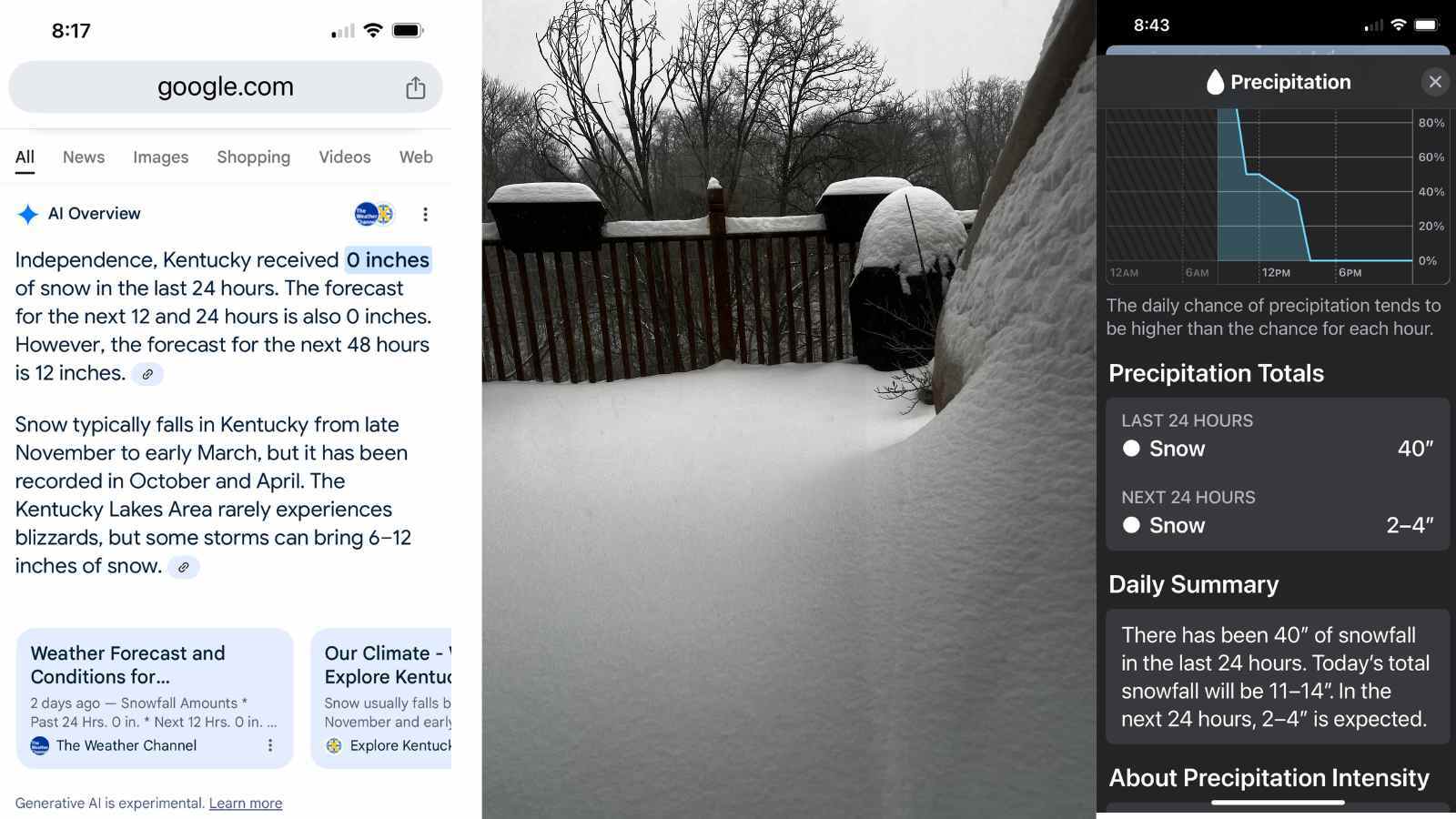I talk to my mother almost every day. This week, during our conversation, she mentioned that there was some snow on the ground.
She asked if we also had snow, and I confirmed that we did.
I had shoveled my driveway several times and estimated we probably had around a foot of snow.
Curious about the exact amount, I quickly searched the internet (my mom enjoys discussing the weather).
However, I discovered that the information provided by the AI was completely inaccurate!
Here is what 0 inches looks like 😂

Obviously, I needed to find better data sources.

It was surprising to see such discrepancies, especially since measuring snowfall should not be that difficult.
Wow, just wow—we definitely did not have 40 inches of snow!
The Perils of Relying Solely on AI for Research
Artificial Intelligence (AI) has revolutionized how we approach research, offering unprecedented efficiency and access to vast amounts of information.
However, as tempting as it may be to lean entirely on AI for academic or professional research, doing so comes with significant risks.
Remember the saying, "Trust, but Verify." This is especially true for AI-generated content and data.
AI - The Illusion of Understanding
AI can create a false sense of comprehension by producing polished, authoritative-sounding outputs that may not always be accurate.
According to a Yale study, AI tools risk fostering "illusions of understanding," where researchers believe they are exploring all possibilities when, in reality, they are confined to questions and methods that align with AI's capabilities.
Relying strictly on AI can lead to a "monoculture of knowing," narrowing the diversity of perspectives and approaches in scientific inquiry.
Check out the article from YaleNews.
Doing more, but learning less: The risks of AI in research
AI-generated insights may prioritize what is popular and frequently cited over what is true. In 2023, more than 10,000 research papers were retracted, but retraction does not mean every link to that research was removed.
All those in links - citations- will make the research appear credible to search engines.
More than 10,000 research papers were retracted in 2023 — a new record.
AI - Bias and Ethical Concerns
AI systems are only as good as the data they are trained on. If the training data is biased or incomplete, the resulting outputs will reflect those flaws.
For example, algorithms trained on non-representative datasets have been shown to perpetuate racial and gender biases.

AI—The good, the bad, and the scary
Special Issue - Proceed with caution: The potential negative impact of AI on scientific research
Ethical concerns abound regarding data privacy and ownership. Many AI models require vast amounts of data to function effectively, raising questions about whether this data was obtained ethically and with proper consent.
One risk of relying too heavily on AI is the potential erosion of critical thinking skills. Virginia Tech researchers warn that overdependence on AI tools can lead users to accept outputs uncritically, diminishing their ability to question assumptions or evaluate the validity of information.

Below are the limitations of using AI for research identified by USC Libraries.
Known Limitations Of Generative AI
"In addition to many of the known limitations outlined below, generative AI may be prone to problems yet to be discovered or not fully understood.
- Large language models (LLMs) are prone to "hallucinations" - generating fictitious information, presented as factual or accurate. This can include citations, publications, biographical information, and other information commonly used in research and academic papers.
- In addition to fictitious information, answers generated by LLMs can be wrong, often times presented as correct or authoritative.
- Due to their fundamental structure, as well as regularly released newer versions, content from many generative AI models can be difficult to reproduce consistently. This is particularly problematic in research and academia where reproducibility is a cornerstone of establishing credibility.
- Generative AI models are not databases of knowledge but rather an attempt to synthesize and reproduce the information they have been trained on. This makes it incredibly difficult to validate and properly attribute the basis of their content,
- Many common generative AI tools are not connected to the internet and cannot update or verify the content they generate.
- The nature of generative AI models, particularly when given simple prompts, can be very reductive, resulting in content that is over-simplified, low quality, or very generic.
- Many generative AI models (including ChatGPT) are trained on data with cutoff dates, resulting in outdated information or the inability to provide answers about current information and events. In some cases, the data cutoff date is not made explicitly clear to the user."
https://libguides.usc.edu/generative-AI/limitations
Without scrutiny, these errors can propagate misinformation and compromise research integrity.
Lack of Transparency and Accountability
AI operates as a "black box" for many users—its decision-making processes are often opaque and difficult to interpret. This lack of transparency can make it challenging to verify the accuracy or reliability of its outputs.
Just because it is on the internet does not make it accurate.
AI tools cannot be held accountable for errors; the responsibility ultimately falls on human users.
As noted by the University of Utah's Research Integrity Office, researchers who rely uncritically on AI-generated content risk accusations of academic misconduct if inaccuracies or plagiarism are discovered.
VPR Statement on the Use of Artificial Intelligence (AI) in Research
July 2023
Overlooking Human Creativity and Context
While AI excels at processing large datasets and identifying patterns, it struggles with contextual understanding and creative problem-solving.
For example, AI can quickly identify opportunities for improvement based on data from your website, but a human needs to understand if those opportunities align with your ideal client.
The opportunity could be a search term that is not relevant to your business,
Without this balance, we risk losing human intelligence's depth and adaptability research.
With all the recent excitement about artificial intelligence, it is more important than ever to remember that technology should aid human inquiry—not be a substitute for it.









